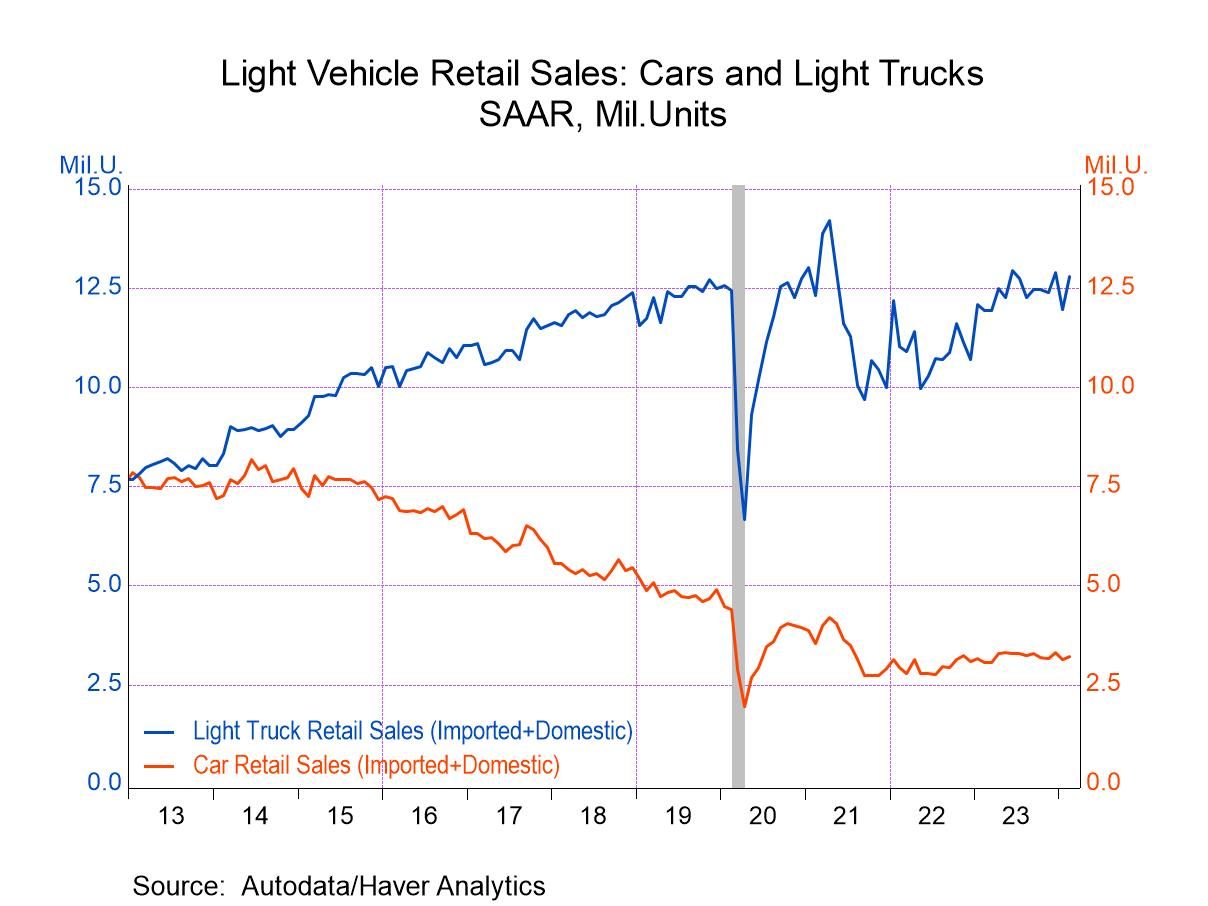U.S. Light Vehicle Sales Rebound in February
by:Tom Moeller
|in:Economy in Brief
Summary
- Light truck & passenger car sales both increase after January declines.
- Imports' market share falls.


The Autodata Corporation reported that light vehicle sales rebounded 6.3% in February (6.4% y/y) to 16.01 million units (SAAR) and made up most of January’s 7.0% decline to 15.06 million units. December’s total was 16.19 million. During Q4’13, motor vehicles & parts subtracted 0.06 percentage point from real GDP growth. Another minimal effect in Q1 is likely based on these results.
Sales of light trucks rose 7.1% (7.2% y/y) during February to 12.8 million units (SAAR) after falling 7.2% in January. Purchases of domestically-made light trucks rebounded 7.7% (6.0% y/y) to 9.95 million units after falling 5.0% in January. Sales of imported light trucks rose 5.2% (11.3% y/y) to 2.85 million units after declining 13.7% during January.
Trucks' share of the light vehicle market edged up to a record 80.0% last month compared to 79.4% in January.
Auto sales rose 2.6% (4.9% y/y) to 3.20 million units (SAAR) following a 5.7% January decline. Purchases of domestically-produced cars rose 4.2% (8.2% y/y) in February to 2.25 million units after falling 8.5% in January. Sales of imported autos held steady both m/m and y/y at 0.96 million after rising 1.1% in January.
Imports' share of the U.S. light vehicle market fell to 23.8% in February from 24.4% in January, but remained above a May 2023 low of 22.3%. Imports' share of the passenger car market eased to 30.0% in February from 30.8% in January. It reached a high of 37.9% in September 2021. Imports' share of the light truck market eased to 22.3% from 22.7% in January.
U.S. vehicle sales figures can be found in Haver's USECON database. Additional detail by manufacturer is in the INDUSTRY database.


Tom Moeller
AuthorMore in Author Profile »Prior to joining Haver Analytics in 2000, Mr. Moeller worked as the Economist at Chancellor Capital Management from 1985 to 1999. There, he developed comprehensive economic forecasts and interpreted economic data for equity and fixed income portfolio managers. Also at Chancellor, Mr. Moeller worked as an equity analyst and was responsible for researching and rating companies in the economically sensitive automobile and housing industries for investment in Chancellor’s equity portfolio. Prior to joining Chancellor, Mr. Moeller was an Economist at Citibank from 1979 to 1984. He also analyzed pricing behavior in the metals industry for the Council on Wage and Price Stability in Washington, D.C. In 1999, Mr. Moeller received the award for most accurate forecast from the Forecasters' Club of New York. From 1990 to 1992 he was President of the New York Association for Business Economists. Mr. Moeller earned an M.B.A. in Finance from Fordham University, where he graduated in 1987. He holds a Bachelor of Arts in Economics from George Washington University.







 Global
Global